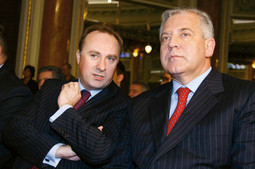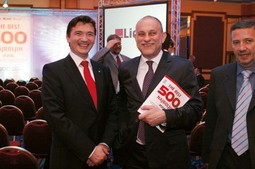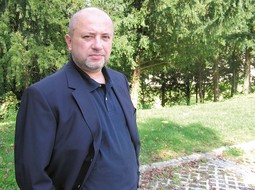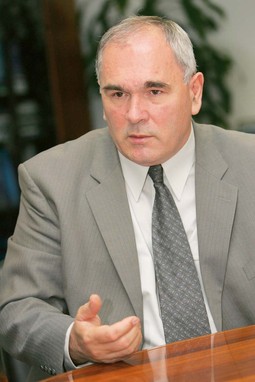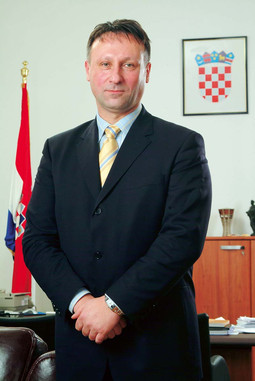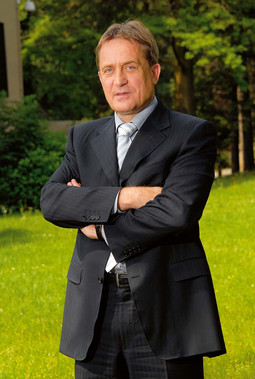THE END OF DAMIR POLANCEC'S CAREER Deputy Prime Minister and HDZ vice president Damir Polancec may have to answer before the law in the Podravka scandal, and it is an open question as to whether the investigation will stop here since Polancec did not make a single decision without prior consultation with former Prime Minister Sanader
The trepidation of himself become the subject of the investigations that are being led into the major scandals rocking Croatia is the underlying reason for last week's appearance by Ivo Sanader at a session of the leadership of the Croatian Democratic Union (HDZ). Formally, the former Prime Minister demanded the defence of Damir Polancec and advocated unity in the ranks of the HDZ, but in reality, Sanader was defending himself from possible judicial investigations and the possibility of being brought to trial. That was the only reason Ivo Sanader ended the three months during which he had sequestered himself from the public and on Thursday, October 22nd, arrived at a meeting that officially dealt with the poor presidential outlook of Andrija Hebrang.
Sanader and Hebrang have for a long time not been politically like-minded and, quite sincerely, the former Prime Minister could care less if Hebrang wins 13 or 17 percent of the vote. This was clear to the gathered top HDZ officials, who know that Sanader does not pay visits to the party headquarters, and new right away that something had to have provided a powerful motivation for him to spend a few hours with them. The motivation is logical. Directly or indirectly, Ivo Sanader is mentioned in five major scandals rocking Croatia - Podravka, Brodosplit, the military lorries, HEP and the Croatian motorways company HAC. Thanks to the power and influence he wielded as Prime Minister he was until recently untouchable, but the situation has now begun to change and the possibility is not excluded that a witness or a former minister, to save themselves from jail, could drop his name.
That is why Ivo Sanader decide by his resolute mien to set the tone of the HDZ session and convince the gathered that they have to cut short the investigations. That evening the initiative was on his side from the get go. In his statements Sanader spoke in terms of "we", and avoided a confrontation with Jadranka Kosor, but it was obvious to whom he was addressing himself. "We are under pressure from the press, the opposition, the State Attorney's Office and the Interior Ministry. They are out to destroy the HDZ. They want to skewer and roast us," Sanader explained. He was not opposed by anyone during his speech, or in the deliberation that followed. Even Prime Minister Kosor's allies remained silent, a participant of the meeting confirmed for Nacional.
Jadranka Kosor did, however, respond, but likewise in a peaceable manner, not speaking directly to Sanader, even though it was clear to all that her words were directed to the former Prime Minister. "I have no intention of stopping police investigations, nor is that possible." She then went on to challenge the proposition that the investigations were an attack on the HDZ and said that clearing up these affairs would benefit the ruling party.
According to Nacional's source, Jadranka Kosor described the situation in Croatia as dramatic, but however much she tried to appear disinterested, it was obvious that Sanader's call for unity and the defence of every HDZ member had given him the initiative. The meeting wrapped up without any kind of conclusion, and sources within the HDZ say that, based on what they know, the former and current Prime Ministers were not in contact again afterwards. The big problem for Sanader is that the press is demanding that the background of the major scandals finally be revealed, and the fact that Mladen Bajic has finally launched a series of energetic investigations.
In reality, ever since the HDZ regained power in 2004, this is the first time that they have be surprised by Chief State Attorney Mladen Bajic, who has placed six managers embroiled in the Podravka scandal in police custody. This scandal, of course, has much broader connotations than the fates of a few members of the board and the director, since there are strong indications that Damir Polancec, the Deputy Prime Minister and HDZ vice president, is behind it all. Polancec's political career is de facto over, and the question now is whether this high-ranking government official will also have to answer to the law. If Polancec winds up before a court, and there is the six that are already in police detention in Remetinec prison, it is a big question if the investigation will end there.
Because Sanader decided on all matters for years, and just as it is clear that the Podravka managers did not make any major decisions without asking Polancec first, so too did the Deputy Prime Minister not do anything without first consulting with the former Prime Minister. To stop the police and the justice department in the Podravka scandal was the only motive Sanader had in his defence of Damir Polancec, because it is probably only a matter of time when someone will mention the name of the until recently Prime Minister in one of the five major scandals being led before Croatian courts.
Podravka
Former Podravka CEO Darko Marinac
The first and most acute crisis situation for Ivo Sanader is the Podravka scandal, in which there is evidence that the former Prime Minister knew of what Damir Polancec was up to. The Podravka scandal has definitely ruined Polancec's political career, and it could easily happen that the continuation of the investigation leads to Sanader. The question is why Polancec would risk going to jail if he had a superior above himself who knew what he was doing. Nacional has been informed from top officials at the Interior Ministry that Polancec is the subject of a preliminary investigation, and Jadranka Kosor recently told her deputy that he should not expect her help. That means that Polancec could be sacked in about two weeks, and if the State Attorney's Office requests it, could also be stripped of his immunity. In these circumstances he could face police detention and a trial, and it will not be at all unusual if in his defence he tries to point out that he was answered to Prime Minister Sanader. If the police investigation continues, all of the suspects will not hesitate to try and save their own skins and shift at least some of the blame to the political arena.
Podravka, a Koprivnica-based food company found it self in big trouble when it was discovered that it had approved a loan of 65 million kuna in 2007 to partner company SMS, owned by Sanader's alleged friend Srdan Mladinic. It turns out that the payment was approved by then Podravka CEO Darko Marinac without the knowledge of the rest of the management. There is evidence that Damir Polancec persuaded Marinac to go ahead with the arrangement, following the instructions of the former Prime Minister. The first tranche of 45 million kuna was paid out in the spring of 2007, and the second of 20 million kuna in the autumn of that same year, with 5.5 percent interest and a two-year grace period. In early 2009 SMS failed to return the first part of the loan and sought a delay in the repayment, and in the summer the problems with the delivery of SMS merchandise to Podravka started. At a hastily convened meeting of the Podravka Supervisory Board it was confirmed definitely that the decision on the controversial loan had been made by Darko Marinac alone, who was, following his dismissal from the post of CEO last year appointed to the helm of the Supervisory Board.
A new scandal followed soon afterwards, when it was discovered that some members of the Podravka management, under the aegis of a part of the executive government, had in 2006 tried to get hold of 75% of Podravka shares. The stakes were to have been assumed by a six-member management and a 60-strong middle management, and the takeover plan had four phases and was worth about two billion kuna. Croatian Government was involved in the plan since the government stake in Podravka is 26 percent, and the start of the operation coincides with the start of the realisation of the FIMA acquisition of 10.64% Podravka shares from Franck and Privredna Banka Zagreb (PBZ). Polancec is alleged to have been present at the meeting at which this was agreed on. When the Podravka - SMS - FIMA scandal broke the story was floated that the plan was conceived to protect Podravka from a hostile takeover attempt by Norway's Rieber & Son. At the same time a source close to Government claims that a part of the former and current Government was embroiled in a Podravka takeover.
In any case, all of the detained members of the Podravka management were appointed to the corporation's leadership thanks to their affiliations with the two key parties in the coalition government, the HDZ and the HSS.
After Marinac was cashiered in July of last year the job of CEO went to Polancec's friend Zdravko Sestak. Also in on the HDZ "quota" to the board was Josip Pavlovic, a party candidate at the last local elections, with Sasa Romac, Polancec's colleague from university, staying on as a member of the board.
Naturally, Josip Friscic, who divided Podravka up with Polancec, also exercised a massive amount of influence on the appointments, and the HSS got two of "its" members of the board - Miroslav Vitkovic and Marin Pucar, who penned the HSS economic policy ahead of the 2007 parliamentary elections.
Brodosplit
Drago Macek
Sanader's position is no better in the Brodosplit scandal, especially after the latest promise from Tomislav Karamarko that the investigation would go on. The police will be thorough in the case, we will renew some of our investigative work and report to the public about it, Karamarko announced last week.
The greatest danger for Ivo Sanader this outcome comes from the possible testimony of Branko Vukelic and Drago Macek. Both are deeply embroiled in millions worth of financial hanky-panky, and given the fact that the investigation has been obstructed for years, it could only have been led by someone very high up in the ruling establishment.
Several key elements link Sanader to the Brodosplit scandal, in which some five million dollars went missing. Above all this pertains to two members of the Brodosplit Supervisory Board - Defence Minister Branko Vukelic (who served as Economy Minister at the time), and Sinisa Poljak, at the time the HDZ organisational secretary and a close Sanader friend. Besides this there are some real signs that the money was transferred to the HDZ accounts t finance the campaign.
As the long-time ruler of the Croatian Democratic Union, Ivo Sanader also bears full responsibility for its finances. And it all started when it was discovered that almost 5 million dollars had been transferred from Brodosplit to Cyprus on the same day that it had been sent to Split from the Bremer Landesbank by Reinhard Wessels, who had placed an order for the construction of four tankers. The entire amount of 4.7 million dollars, was then sent from Cyprus to Graz to the account of the McArthur Company at the Volksbank, which Drago Macek, a broker with the Iceberg Company, had access to.
There was serious suspicion of money laundering, the financing of politicians who decided that Brodosplit build for Wessels specifically, and not someone else. Macek managed to pick up some of the money before the Austrians blocked the account and sealed the safe, and asked the Croatian authorities to check out these suspicious transactions, and Mladen Bajic decided not to prosecute the buyer Reinhard Wessels, and then HDZ members of the supervisory board, Minister Branko Vukelic and Sinisa Poljak.
Vukelic claimed not to have known anything, and Poljak was chucked out of the supervisory board and dismissed from all of his posts in the HDZ.
It was almost three years ago that Mladen Bajic received a report from the Austrian police, drafted on 15 December 2006, which, among other things, reveals the owners and users of three bank accounts to which Drago Macek transferred 4 of a total of 6 million dollars. The Austrian police stated that the owners of the three accounts were then Brodosplit CEO Goran Vukasovic, the director of the manufacturing and commercial sector Ante Luetic and Sinisa Poljak, the former vice president of the Brodosplit supervisory bard and the HDZ organisational secretary, a close and long time friend of former Prime Minister Ivo Sanader.
"Quite surely," Government sources confirmed at the time for Nacional, "this information has been received by Prime Minister Sanader. But the information that has arrived from Austria leaves open the question of the fourth participant in the transaction, for which it is justifiably assumed that it is an influential and high ranking person in Croatia," the well-informed source told Nacional. It was reported recently that Drago Macek had in September of 2008 been ready to talk in exchange for the status of state's witness.
When it appeared that under pressure from Austria and the discoveries made by its money laundering prevention bureau, which broke the case, an investigation would be launched into the extraction of 4.7 million dollars from the Split shipyard, Macek sent intermediaries to the people engaged in the investigation to feel out the situation. He said he was willing to strike a deal and tell of how he shared the money sucked out of the shipyard with the Zuzul brothers, Ante and Slaven, owners of the Skladgradnja Group company, but under the condition that he not be placed in police detention and that criminal proceedings against him be discontinued. At the time a figure of 5 million dollars was cited, allegedly to have been divided up with the Zuzul's.
Top officials at the Interior Ministry and State Attorney's Office discussed the offer, who were informed that Macek had been unnerved by the idea of criminal persecution and detention and was willing to cooperate. There is allegedly an official note on this matter, a part of the Brodosplit case file, but in the end it all fell through when Macek backed out of his possible cooperation with investigators after having received a signal that the entire case would be watered down.
Just like for Polancec in the case of Podravka, Vukelic too on account of Brodosplit faces the threat of much more serious punishment than just their political disqualification. He is currently on sick leave because of heart problems, but can hardly expect to live a stress-free life in the future. If Jadranka Kosor allows the investigations to continue, Vukelic will inexorably become the chief target of the police and judiciary, and one should not disregard the influence of the public and the press who want a resolution to the classic example of covering up for banditry. In the frame of this scenario, Sanader will hardly be in a position to say that Brodosplit is of no interest to him.
HEP
Ivan Mravak is accused of fictitiously employing Rade Buljubasic, which top HDZ officials are probably behind
Former Prime Minister Ivo Sanader is directly embroiled in the scandal at HEP, the state-owned national electric power authority, which broke mid-way through this summer. It all started when the press discovered that Rade Buljubasic, a Croatian returnee from Australia, was employed at HEP, were he was paid a wage, but in fact worked for the HDZ. In a country with thousands of similar cases Buljubasic's would perhaps not have provoked too much attention had this returnee not admitted the following days that Sanader had personally secured him the job and made it possible for him to purchase a HEP apartment. Rade Buljubasic explained how he had, together with Branimir Glavas, secured Sanader's triumph over Ivic Pasalic, and was in return invited to Croatia in 2006 where he was provided with a bogus job and the opportunity to buy an apartment at preferred conditions.
This was followed by a series of articles detailing the poor business policies of the HEP top management, and in it all the name of Sanader was somehow lost and HEP CEO Ivan Mravak wound up fingered as the chief culprit. In late August the Interior Ministry suspected Mravak and four other HEP officials of having employed Buljubasic and allowing him to receive wages for four years without having to come to work. The damages are alleged to amount to 670,000 kuna, but, what is interesting is that at the time - even though the scandal was in the spotlight for a month - no one in the police force or the State Attorney's Office, in spite of Buljubasic's explicit admission that it had all been set up for him by the former Prime Minister, gave so much as an inkling that they intended to question Ivo Sanader. The consequences in the HEP scandal were borne by Mravak and the members of the board, who were dismissed with, admittedly, golden parachutes to the tune of 4.2 million kuna, but it still remains to be seen where the criminal persecution of these persons will now ensue. But it is quite clear that the State Attorney's Office has to look into the role played by Ivo Sanader in the matter, who brought Buljubasic to Croatia and secured him an excellent wage and apartment, whereby he caused damages to the state of at least 670,000 kuna. And it would be very strange indeed if Mravak was to take all of the blame on himself and not reveal to the police at least the name of the person that ordered him to see to the material welfare of Rade Buljubasic, all the more so since this returnee from Australia clearly pointed to Ivo Sanader.
The lorry scandal
THE LORRY SCANDAL The only question is whether Berislav Roncevic will want to go to jail if he did something on Sanader's orders
Logically regarded, the only open question in the lorry scandal is not whether Berislav Roncevic is guilty, but rather, will the former Defence Minister agree to going to jail if he was working under Ivo Sanader's orders.
Thanks to the many years of President Stipe Mesic's doggedness, the State Attorney's Office recently finally asked Croatian Parliament to strip former Defence Minister Berislav Roncevic of his immunity as a Member of Parliament, so that it might institute criminal proceedings against him, i.e. raise an indictment for illegal activities in the procurement of military lorries in 2004. The request was finally adopted and on 16 October Roncevic was stripped of his immunity, with all 102 MPs present, voting in favour.
The stripping of immunity was requested after USKOK (The Bureau for the Prevention of Corruption and Organized Crime) completed its investigation into the dealings of Roncevic and his former assistant Ivo Bacic on suspicion that they had in 2004, by purchasing Iveco military lorries from the Eurokamioni company through direct negotiated procedure, caused damages to the national budget of at least 10 million kuna, which was how much cheaper MAN lorries were on offer for.
Roncevic and Bacic were secretly questioned at USKOK as suspects. In the investigation into the lorry scandal financial and technical expert opinions were sought, which confirmed that more expensive lorries had been purchased, and that the former defence minister had concluded a detrimental contract. Off the record it has been learned that some of the witnesses questioned in the investigation confirmed that they had been ordered by the former minister to conclude the procurement deal with the Eurokamioni company, regardless of any more favourable offers from other bidders.
Ivan Drmic of the Croatian Democratic Congress of Slavonia & Baranja (HDSSB) party has stated that he suspects former Prime Minister Ivo Sanader of having ordered Roncevic to break the law in the procurement of the military lorries, and that the HDZ is now disowning Roncevic to speed up his trial, before a new government comes into power "which might dig much deeper in the investigation." "Why would Sanader make such an effort to protect and defend Roncevic, when he is known to be very vain, and would not abandon just a minister, but even his party if he judged that it could benefit or hurt him? The conclusion is that Sanader is the chief octopus and that he ordered Roncevic to break the law," said Drmic. As a close collaborator of Glavas', Drmic no doubt has little affection for Sanader, but the fact is that the former Prime Minister protected Roncevic and used his political influence to hamper the investigation as far back as in 2004 when the lorry scandal broke.
And one of the last decisions made by Sanader as Prime Minister was to sack Police General Director Vladimir Faber in June of this year. According to the interpretation of Faber's associates, the Prime Minister decided to fire the Police General Director because of his decisiveness to investigate the lorry scandal at the Ministry of Defence. Faber was during those days to have received the results of the expert findings, which show that Berislav Roncevic, while serving as Defence Minister, caused damages to the Defence Ministry in excess of ten million kuna. But Sanader got involved and personally decided to dismiss Faber.
The Croatian motorways company
BOZIDAR KALMETA There have been warnings for years that there are numerous irregularities in the operations of the Croatian Motorways Company (HAC) and evidence that corruption is afoot. Frequently mentioned along with the HAC top management is the competent minister, Bozidar Kalmeta, and his close associate Ivo Livakovic. Nacional has recently learned from high-ranking politicians that the State Attorney's Office is investigating information according to which Kalmeta, with Sanader's cognisance, secured 50 million kuna from the ministry he leads for the HDZ parliamentary election campaign. It is not known yet in what phase the investigation is, but Nacional's source, close to the current national administration, claims that the State Attorney's Office is focused on high-ranking politicians.
And also coming onboard the investigation into the dealings of HAC is the European Union. The involvement of OLAF, the European anti-corruption bureau, in investigating the trail of money that the European Bank for Reconstruction and Development (EBRD) invested into some projects, and in connection with the fact that the tenders were fixed by HAC and some other Croatian state-owned firms, appears to have kick-started the competent domestic institutions into action, who have taken a serious interest into the scandals that have flooded the press over these past years. OLAF spokesman Jörg Wojahn has said that the "investigations are ongoing, and are focused in particular on the construction of motorways in Croatia."
In comparison with the situation that existed at the start of this past summer, the situation has now changed fundamentally and Government bodies are ever less willing to defend Ivo Sanader from charges that he took part in the major national scandals. If something should be recognised of Jadranka Kosor, then it is her perseverance to date in clearing up the scandals regardless of whether HDZ officials are involved. Berislav Roncevic has been stripped of his immunity, Damir Polancec faces political marginalisation and will probably wind up defending himself in court, and Branko Vukelic will be happy if he has to answer politically for the Brodosplit scandal.
The police and State Attorney's Office now have an opportunity to work quite independently, and in these circumstances Sanader cannot be unconcerned. He has been brought into connection with the five biggest corruption scandals in which verdicts have yet to be passed. This also implies the possibility of additional investigation and amended indictments - because Prime Minister Kosor is not working to prevent it, and on Sunday Interior Minister Tomislav Karamarko, although without naming names, rejected Sanader's criticism and announced that the investigations would continue. It will be interesting to see whether USKOK and the State Attorney's Office finally decide to call Ivo Sanader, at least for questioning, because he has too often been brought into connection with the scandals for it to be ignored.
They want to skewer us
■ In his statements at the meeting of the HDZ leadership Sanader spoke in terms of "we", and avoided a confrontation with Jadranka Kosor, but it was obvious to whom he was addressing himself. While he expounded his take on who was against "them", no one contradicted him. "We are under pressure from the press, the opposition, the State Attorney's Office and the Interior Ministry. They are out to destroy the HDZ. They want to skewer and roast us," Sanader said dramatically. In an equally peaceable manner, Jadranka Kosor responded saying that she had no intention of stopping police investigations.
